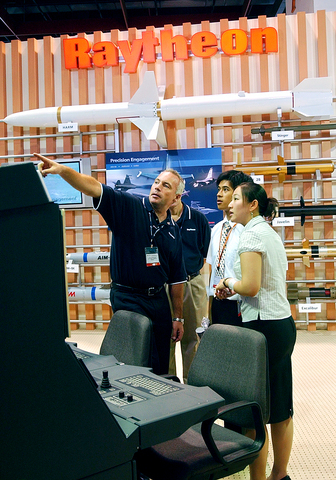Raytheon Co, the world's largest missile maker, said it's seeking partners among Taiwan companies and plans to set up a maintenance-repair center on the island.
"Over the past four decades, we just sold products to Taiwan, but have yet to establish partnership here," Torkel Patterson, president of Raytheon International, Inc, said yesterday in Taipei, where the company is holding an exhibition.
Raytheon is among 18 overseas and 56 local exhibitors participating Aug. 11-14 at the Taipei Aerospace and Defense Technology Exhibition.

PHOTO: AP
The company, which is based in Waltham, Massachusetts, is cooperating with Taiwan's government-backed Institute for Information Industry to jointly develop air traffic control systems, said Patterson, who didn't elaborate.
The Cabinet is proposing a budget of NT$480 billion (US$15 billion) for the next 15 years to buy submarines, anti-missile equipment and anti-submarine aircraft. The proposal, scaled back by 21 percent from a larger plan, is pending in Legislative Yuan after lawmakers balked at the original request.
"We hope to grab some of the orders," Patterson said, without elaborating.
Taiwan said it needs to increase defense spending because of rising tensions and military threats from China, which has 706 missiles aimed at Taiwan and is adding 120 more each year.
Excluding arms purchases, Taiwan has budgeted about NT$267 million for defense spending this year, or about 17 percent of the total.
The nation's annual defense budget last year accounted for 2.8 percent of gross domestic product, less than South Korea's 3 percent, the US's 4 percent, Singapore's 4.3 percent and Israel's 8 percent, the presidential office said in 2004.
Raytheon doesn't have a timetable for its Taiwan maintenance-repair center, Communication Manager Paul Stefens said. The company on June 23 received a US Air Force contract valued at US$752 million to provide Taiwan with an early-warning radar system.
The system will enable the Taiwan Air Force to detect and track ballistic and cruise missiles as well as aircraft and ships.

Intel Corp chief executive officer Lip-Bu Tan (陳立武) is expected to meet with Taiwanese suppliers next month in conjunction with the opening of the Computex Taipei trade show, supply chain sources said on Monday. The visit, the first for Tan to Taiwan since assuming his new post last month, would be aimed at enhancing Intel’s ties with suppliers in Taiwan as he attempts to help turn around the struggling US chipmaker, the sources said. Tan is to hold a banquet to celebrate Intel’s 40-year presence in Taiwan before Computex opens on May 20 and invite dozens of Taiwanese suppliers to exchange views

Application-specific integrated circuit designer Faraday Technology Corp (智原) yesterday said that although revenue this quarter would decline 30 percent from last quarter, it retained its full-year forecast of revenue growth of 100 percent. The company attributed the quarterly drop to a slowdown in customers’ production of chips using Faraday’s advanced packaging technology. The company is still confident about its revenue growth this year, given its strong “design-win” — or the projects it won to help customers design their chips, Faraday president Steve Wang (王國雍) told an online earnings conference. “The design-win this year is better than we expected. We believe we will win

Chizuko Kimura has become the first female sushi chef in the world to win a Michelin star, fulfilling a promise she made to her dying husband to continue his legacy. The 54-year-old Japanese chef regained the Michelin star her late husband, Shunei Kimura, won three years ago for their Sushi Shunei restaurant in Paris. For Shunei Kimura, the star was a dream come true. However, the joy was short-lived. He died from cancer just three months later in June 2022. He was 65. The following year, the restaurant in the heart of Montmartre lost its star rating. Chizuko Kimura insisted that the new star is still down

While China’s leaders use their economic and political might to fight US President Donald Trump’s trade war “to the end,” its army of social media soldiers are embarking on a more humorous campaign online. Trump’s tariff blitz has seen Washington and Beijing impose eye-watering duties on imports from the other, fanning a standoff between the economic superpowers that has sparked global recession fears and sent markets into a tailspin. Trump says his policy is a response to years of being “ripped off” by other countries and aims to bring manufacturing to the US, forcing companies to employ US workers. However, China’s online warriors